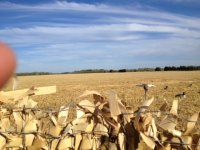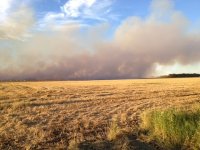Big fire started about 15 mile south of Hosmer. Very windy day today and a fire was reportedly started by hunters driving across a soybean field. Burnt 12 miles long and burnt up one tractor and one fire truck. No one hurt. This is just rumor but I am sure more details will be coming. Nobody had any business hunting today .
You are using an out of date browser. It may not display this or other websites correctly.
You should upgrade or use an alternative browser.
You should upgrade or use an alternative browser.
Big fire supposedly started by hunters.
- Thread starter haymaker
- Start date
benelli-banger
Well-known member
Bummer…
3car
Active member
I watched one blow up yesterday and reported it to dispatch. The head fire was coming directly at a farm yard on HWY 37 north of Groton. I was knocking on the door to get people out of the house. It was impressive and the local farmers probably saved that yard from being burned up.
randywatson
Member
Not a rumor, my buddy was one of 3 fire fighters caught in the middle of the fire. he's incredibly lucky to be alive. engulfed them and not certain on the details yet, he texted me last night. here is the text i received.
I know this is heavy but I was never so scared ever like I was today. I thought I was going to die. Two others and I got trapped in a fire. I never want to experience that again! This fire involved twenty plus tractors with disks, 13 departments with 60 trucks and 18 semis hauling water. It started ten miles west of Roscoe and stopped 8 miles south of Roscoe.
I know this is heavy but I was never so scared ever like I was today. I thought I was going to die. Two others and I got trapped in a fire. I never want to experience that again! This fire involved twenty plus tractors with disks, 13 departments with 60 trucks and 18 semis hauling water. It started ten miles west of Roscoe and stopped 8 miles south of Roscoe.
benelli-banger
Well-known member
Whoa!!!! ??
BRITTMAN
Well-known member

Fire truck, tractor damaged in Edmunds County grassfire
Officials in Edmunds County say 13 departments responded to a grass fire on Sunday.
Powderhorn Jim
Well-known member
Unfortunately a lot of hunters don't think about that catalytic converter hanging down there very close to the ground. If you want to get a cussing out from the locals, park your vehicle on dry grass/corn/soybeans, whatever will burn. Loss of life, loss of property, endangering good folks is not a joke.
Randy - Thank God your friend, and all others involved survived that massive field fire. When it covers that much ground, it likely also included some standing crops. As dry as it is in SD right now, the risk for field fires is extreme. I do wonder how the liability works, as the only ones I've seen were started by farm machinery. Again., thank goodness everyone involved is ok...........
I can attest to how scary they are. Northern Alberta's climate is considered arid, so fall harvest almost always has a few stretches of high risk for field fires. in 2013, we set up for an afternoon waterfowl hunt in the middle/east side of a 1/2 section wheat field, that was 90% combined. Winds were strong out of the west, and our friend Gary was combining the last 30-50 acres on the west end. it had been a wetter than normal summer, so the stubble and tailings were thick. We started seeing smoke from where the combine was, and then fire. it spread rapidly, and quickly spread N-S as it burnt the field from west to east. Your first thought is - is Gary ok - and your second thought is, we need to get the hell outta here! We tore down the blind, grabbed as many decoys as we could, loaded up the truck, and left the field. Another friend showed up with a tractor & disc, cutting a fire break on the west side of the field. the real savior was the field butted up to a road, so as long as the embers didn't jump the road, the fire was done - which is what happened. we lost nine or so goose decoys - just ran out of time to grab everything - and Gary (and his combine) were safe - most importantly. It turns out his combine spun a bearing, which caused sparks that ignited the field. I've witnessed 4 field fires up there, very frightening and lives are truly at risk. The smoke is very dangerous as well.
Just a mile from our house there was a small 20 acre field fire (contained to 20 acres) Friday night & fortunately nobody was hurt. Sadly, it did burn up a Steiger 550 Hydrotrac
Here's a few pics from the Alberta field fire
I can attest to how scary they are. Northern Alberta's climate is considered arid, so fall harvest almost always has a few stretches of high risk for field fires. in 2013, we set up for an afternoon waterfowl hunt in the middle/east side of a 1/2 section wheat field, that was 90% combined. Winds were strong out of the west, and our friend Gary was combining the last 30-50 acres on the west end. it had been a wetter than normal summer, so the stubble and tailings were thick. We started seeing smoke from where the combine was, and then fire. it spread rapidly, and quickly spread N-S as it burnt the field from west to east. Your first thought is - is Gary ok - and your second thought is, we need to get the hell outta here! We tore down the blind, grabbed as many decoys as we could, loaded up the truck, and left the field. Another friend showed up with a tractor & disc, cutting a fire break on the west side of the field. the real savior was the field butted up to a road, so as long as the embers didn't jump the road, the fire was done - which is what happened. we lost nine or so goose decoys - just ran out of time to grab everything - and Gary (and his combine) were safe - most importantly. It turns out his combine spun a bearing, which caused sparks that ignited the field. I've witnessed 4 field fires up there, very frightening and lives are truly at risk. The smoke is very dangerous as well.
Just a mile from our house there was a small 20 acre field fire (contained to 20 acres) Friday night & fortunately nobody was hurt. Sadly, it did burn up a Steiger 550 Hydrotrac
Here's a few pics from the Alberta field fire
Attachments
Miforester
Well-known member
I saw this burning off in the distance yesterday, being a wildland fire i kept inching closer to the area, but new better then to get to close. Glad your buddy is ok! Easy to get entrapped with the major winds from yesterday i'm sure spotfires were putting up well in front of the head fire. I was talking to a farm hand today and they were helping with the fire, two of there tractors had to resort to lakes to escape the fire, they were stuck and luckily werent injured or loss any equipment.
Miforester
Well-known member
The Farmer whose property i hunt on just texted and said it was a hunters vehicle idling in tall grass that started the fire yesterday! As mentioned in an earlier post don't realize how the threat their vehicles can be, not to mention 30 mph winds.
randywatson
Member
Talked w my buddy yesterday. couple tractors got burned up along w a firetruck or 2.
couple tractors buried themselves in wet sloughs to escape the oncoming blaze. they got them out the next day.
he was on the back of a truck when
the blaze caught up to them. the driver of the truck just floored it and went through the firewall to escape on the backside of the burned area.
occupied houses in the path were saved. siding was curled on some and grass burnt up to the foundations. over 7,000 acres burned.
couple tractors buried themselves in wet sloughs to escape the oncoming blaze. they got them out the next day.
he was on the back of a truck when
the blaze caught up to them. the driver of the truck just floored it and went through the firewall to escape on the backside of the burned area.
occupied houses in the path were saved. siding was curled on some and grass burnt up to the foundations. over 7,000 acres burned.
3car
Active member
Talked w my buddy yesterday. couple tractors got burned up along w a firetruck or 2.
couple tractors buried themselves in wet sloughs to escape the oncoming blaze. they got them out the next day.
he was on the back of a truck when
the blaze caught up to them. the driver of the truck just floored it and went through the firewall to escape on the backside of the burned area.
occupied houses in the path were saved. siding was curled on some and grass burnt up to the foundations. over 7,000 acres burned
Sounds like they got really lucky. Hind sight is always 20/20 and don't get me wrong. I've been in some bad spots too on fires but I always encourage VFD guys to get their Red Card or S-130/S-190 certification training for wildland fire. I've seen some really scary tactics over the years from non certified fire fighters.
Miforester
Well-known member
My Farmer friend sent some drone photos of the fire, pretty impressive the man and equipment power they threw at this fire. Glad everyone was safe.


